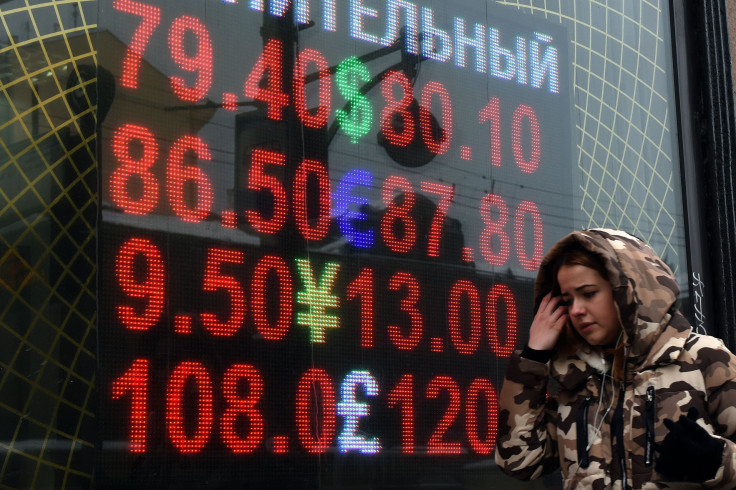Russian Ruble Plunges Deeper Against US Dollar After Central Bank Indicates It Won't Intervene

The Russian ruble sank to an all-time low Thursday after the central bank indicated it would not intervene to shore up the currency. The ruble fell as much as 5.3 percent to more than 85 to the U.S. dollar, tumbling to its biggest two-day drop in a year.
The Russian currency first broke 80 to the dollar Wednesday for the first time since the country’s 1998 currency crisis. The ruble’s extended slide mirrors the ongoing rout in the price of oil, Russia’s top export. Brent crude, the global benchmark, plunged to nearly $27 a barrel this week as China’s weaker economic outlook sparked fears of a decline in global oil demand.
Bank of Russia Governor Elvira Nabiullina told Bloomberg Wednesday the ruble was approaching “fundamental levels” and said the bank would not intervene unless “risks to financial stability” appeared. Nabiullina intended to reassure the market, but analysts criticized the bank governor for inviting speculation about instability in the broader Russian economy, Bloomberg reported.
“Sometimes it’s better for a central banker to say nothing,” Lutz Karpowitz, an analyst at Commerzbank AG, told the news outlet.
Russia’s currency last year dropped 24 percent on previous falls in commodity prices and Western sanctions on Moscow related to Russia’s intervention in Ukraine. The continued collapse of oil prices is compounding problems for the government, which is already grappling with its sharpest economic contraction since 2009. Oil and natural gas revenues account for about 50 percent of Russia’s federal budget revenues.
Adding to Moscow’s pain Thursday, a British judge accused Russian President Vladimir Putin of backing a plan by the country’s security service to kill Alexander Litvinenko, a former agent-turned-Kremlin critic who died in 2006 after drinking tea laced with polonium-210, the Associated Press reported.
Judge Robert Owen, who led a public inquiry into the killing, said there was a “strong probability” Russia’s FSB, the successor to the Soviet Union’s KGB spy agency, ordered the killing, and the operation “probably [was] approved by Putin” during his first term as president, the AP said.
© Copyright IBTimes 2024. All rights reserved.




















